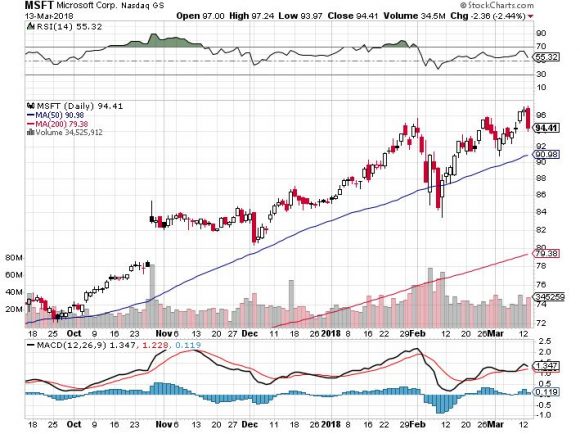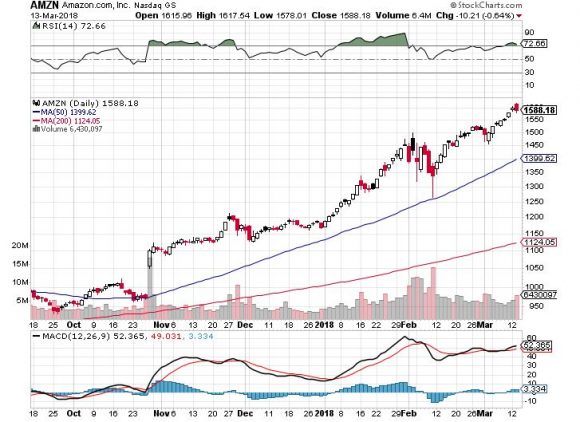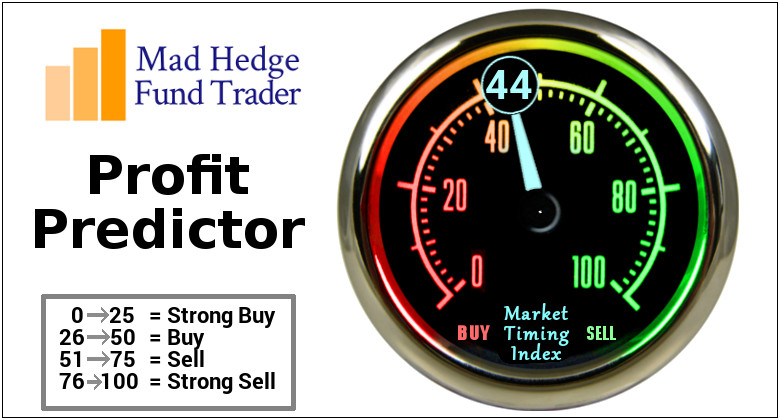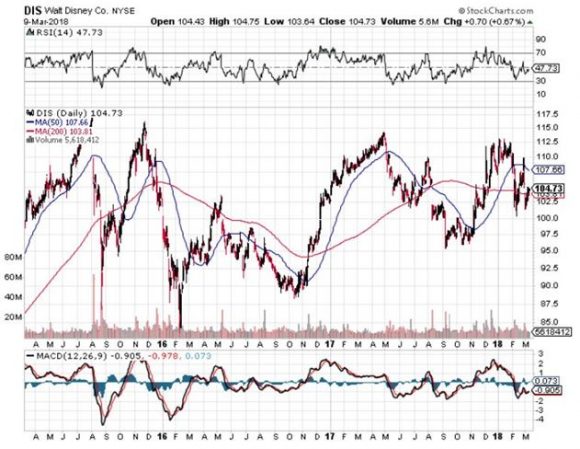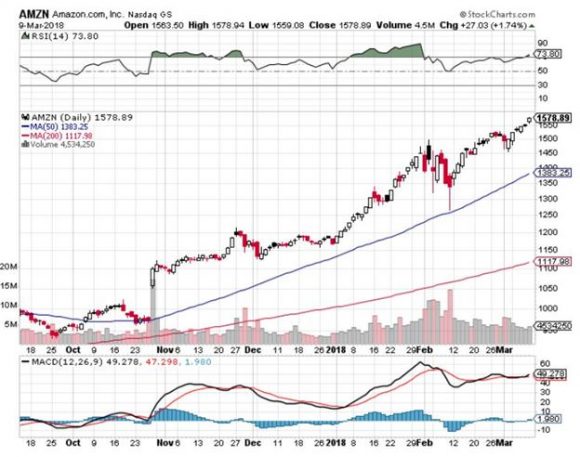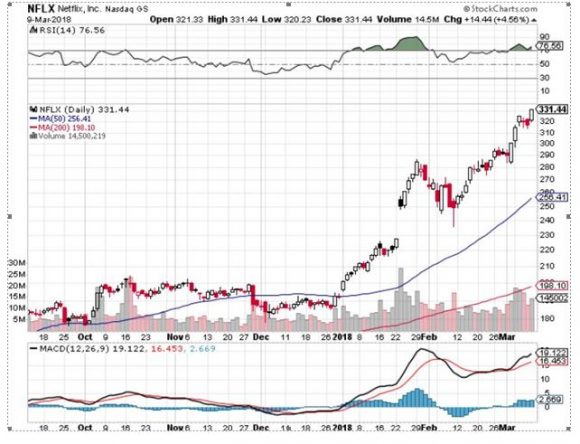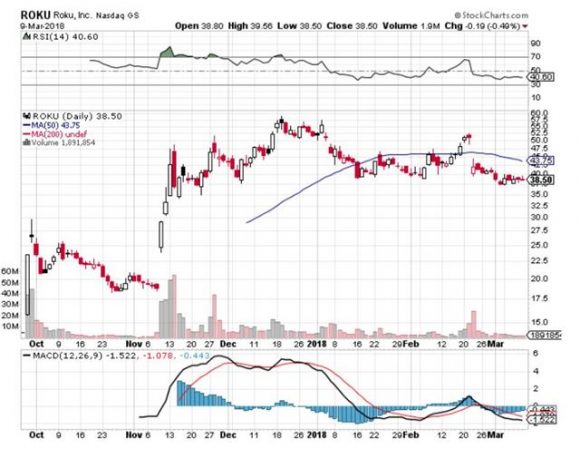Mad Hedge Technology Alerts!
Investors are clamoring for cloud plays, which along with artificial intelligence (AI) have become the hottest investment themes of 2018.
However, many are ignoring one of the best new cloud plays of all, and that would be Microsoft (MSFT). However, this is not your father's Microsoft.
Microsoft (MSFT) is the poster boy for legacy tech turned cutting edge once again. It is now one of the top three cloud companies behind Amazon (AMZN) and Google (GOOGL) and is closing fast.
In fact, most people have been using their products for years and have no clue of this amazing turnaround.
This year, 2018, has been the year of the cloud. As such, cloud stocks have been bulletproof, with leaders including Salesforce (CRM) and Red Hat Inc. (RHT) celebrating all-time highs.
The cloud companies are basking in the momentum of rising earnings and accelerating growth. Their fundamental stories are solid, and growth drivers unrelenting.
The No. 1 reason is the sheer increase in global data. Market intelligence services predict total data will grow to 163 zettabytes by 2025, which is 10 times the data generated in 2016.
For all the math geeks out there, 1 zettabyte is a trillion gigabytes.
This incredible volume of data will uncover new types of business and the user experience will evolve. In the near future, more than 20% of the data will be imperative just to normally function by 2025.
Big data is smartly harnessed by all profitable companies today and this data needs storage - huge amounts of it.
Fortune 500 companies operate from cloud software that streamlines and harmonizes operations, which is called enterprise software. The data accumulated on these platforms is digital gold, and infers trends and paradigm shifts on which CEOs base game changing-decisions.
The best up-and-coming cloud business is hands down Microsoft Azure. The existential threat of (MSFT)'s Azure is probably the only thing that keeps Jeff Bezos awake at night.
Azure produced a revenue beat for the ages, increasing by 98% QOQ. Microsoft's Azure public cloud is eating into Amazon Web Services (AWS) market share.
AWS is critical to Amazon's (AMZN) fortunes as its outperformance allows Bezos the cash flow to dump products on its e-commerce platform at or below cost, seizing market share and a higher stock price.
Microsoft delivers hybrid consistency, developer productivity, AI capabilities, and trusted security and compliance on Azure to its corporate customers. Partnering with other firms to provide cloud services is punctuated by bottom- and top-line outperformance.
At the micro level, investors can deduce the sticky underpinnings that are creating a profitable moat around Azure with these few examples.
Microsoft has an important relationship with Chevron (CVX), which uses Azure IoT to harness massive amounts of seismic data from its oil fields to accelerate deployment of modern, intelligent solutions for oil exploration.
Azure's cloud services also help Chevron manage thousands of oil wells dotted around the world, increasing revenue and operating safely and reliably.
Kohler is another company to link up with Microsoft's cloud bundle by building connected, voice-activated products powered by Azure IoT and Johnson Controls (JCI). GLAS thermostat with Cortana voice control uses scalable device management capabilities in Azure IoT and Windows IoT.
The Kroger (KR) supermarket chain is deploying Azure to fuel its digital grocery store display for real-time pricing, discounts and promotions based on shoppers' data to levitate sales.
Home improvement company Lowe's (LOW) in-store robot uses Azure to manage inventory and notify human management of out-of-stock or misplaced items. This is yet another example of humans and robots working in perfect harmony.
These are some of the examples of why Microsoft Azure is tearing into AWS's market share. Azure simply offers a more robust set of cloud software solutions compared to AWS because of its better enterprise functions, and it may become the future for all of us.
Another segment that gets little love is the LinkedIn purchase by Microsoft in 2016. LinkedIn, the employment networking site, aided by strong sales execution totaled $1.3 billion in quarterly revenue. Higher user engagement, customer acquisition, renewals and upsell performance make this the preeminent platform for business networking.
The next step is further integrating the leading professional cloud with the leading professional network. This marks the fifth consecutive quarter of more than 20% growth for LinkedIn. I believe more can be done to monetize LinkedIn, and the potential is enormous.
Another segment that really cuts across the majority of the tech ecosphere via GPUs, A.I., hardware and software is gaming. Today, gaming is as hot as cord cutters, and millennials love playing video games.
Microsoft has been in the gaming space since the beginning, and revenue sprouted up by 8% QOQ driven by hardware revenue growth of 14% QOQ. The hardware comes in the form of premium console, the Xbox One X, the top-selling console in the US this past holiday season.
Microsoft has parlayed its commitments in gaming into acquiring PlayFab, which serves upward of 700 million avid gamers with more than 1,200 games from Disney, Rovio and Atari. It's a unique backend platform for mobile, PC and console game developers to scale up cloud-connected games linked with Azure to provide a world-class cloud platform for the gaming industry.
Microsoft is so much more than just an operating system and Microsoft Office in 2018. That is the old Microsoft. And that being said, Office 365 increased subscribers to 29.2 million last quarter, up from 28 million QOQ.
We have been in and out of Microsoft many times. Now, if it would only give us another decent dip, we could revisit the trough one more time.
Mad Hedge Technology Letter
March 13, 2018
Fiat Lux
Featured Trade:
(WHY YOUR HATED CABLE COMPANY IS ABOUT TO DIE),
(AMZN), (NFLX), (APPL), (DIS), (GOOGL), (TWTR), (FB), (ROKU)
Look at any survey of the most despised companies in America and there is always one industry that comes out on top: cable companies such as AT&T, (T), Comcast (CMCSA) and Charter Communications (CHTR).
We all have been reading about cord cutting and the death of cable for years. However, this trend is about to vastly accelerate.
The death of cable is upon us in full force and streaming plays should represent a heavy weight in any aggressive portfolio.
Jerry Seinfeld and David Letterman are two Hollywood names gracing the broadband waves of Netflix (NFLX). Add one more superstar name to the mix as that of former President of the United States, Barack Obama.
Obama has tentatively agreed to produce new content centered on inspirational people and their stories. Add in former First Lady Michelle Obama who also will play a part in compiling the new content. You can expect about half the country to watch it.
Amazon (AMZN) and Apple (APPL) were lining up deals before Netflix scored the arrangement. Music streaming giant Spotify, set to go public later this month, also has a deal on the table with former President Obama to be the face of a presidential playlist.
The bidding war for top content is hugely bearish for traditional media companies such as Disney (DIS), which is subject to stringent regulation from the FCC (Federal Communications Commission). Disney stock has been languishing in the doldrums for years, peaking at $120 in mid-2015. It is still hovering around the $100 level 3 years later.
The recent risk-off move in (DIS) can be attributed to one horrific segment of the business that was its main growth driver for 25 years - ESPN.
In the 1990s, ESPN was a media darling for the ages. It could do no wrong. Its base, mainly young tech-savvy males, loved every piece of content from the daily sports news to the live games that permeated its channels.
Then cord cutters started appearing out of the woodwork and swiftly migrated to (NFLX)'s attractive pricing at $8.99 per month in 2015, which sure beats cable at upward of $100 per month.
Better late than never is that Disney finally announced a unique proprietary streaming service straight to the consumer in 2018. The three years of inaction put the company three years further back in the quickly growing broadband streaming revolution. Disney also stated it will pull all (DIS) content from competitor (NFLX).
Legacy companies have a two-pronged problem: saddled with irrevocable multi-year commitments absorbing capital and a behemoth legacy business in marginal decline that is a headache to shift. Asking the Titanic to suddenly transform into a fancy speedboat is a tough ask for anyone.
The red flags are unbridled in the cable universe. Fox Networks plans to readjust hourly ad load down to 2 minutes within 2 years! Fox has some work to do to whittle down the ad load because last year's hourly ad load clocked in at 13 minutes. Advertising executives indeed feel aghast in what will be known as the first phase of the death of cable. This machination is unquestionably bullish for social media platforms such as Facebook (FB) and Twitter (TWTR) because net ad loads are migrating to millennial eyeballs on those platforms.
Millennials, currently the biggest consumer-ready demographic, are the most advertising-adverse generation ever to exist. Stories of binge-watching (NFLX) are rife, and live sports shows increasingly are found pirated online from Eastern Europe.
TV ratings are rapidly declining to the degree that bottom line growth will be materially harmed. Traditional media is experiencing a cocktail of lethal headwinds that could wipe it out totally. Simply put, commercials negatively affect the user experience and the plethora of options in the streaming world makes it a buyers' market.
(NFLX)'s hyper-accelerating subscriber growth begets higher growth. Love them or hate them, (NFLX) and (AMZN) business models are the architectural blueprints applied to every tech stock. To be condemned as a legacy business is the most damning label in the tech industry.
Hiring Bill Ackman is probably the only move that would be worse. Anyone not betting the ranch on broadband streaming is quickly banished to investor purgatory with the likes of GameStop Corp. (GME).
Tech is starting to get priced as a luxury. Gone are the days of disheveled mopheads joining forces in a shabby Los Altos, Calif., garage as did Steve Jobs and Steve Wozniak. Groundbreaking tech is power, and big tech knows it.
As much as I would like to rain on (NFLX)'s parade, I cannot. Investors only look at one number as they do with many other tech companies. The company's license to spend gobs of cash on new content revolves around subscriber growth.
Last year was full of whispers that (NFLX)'s domestic mojo would start to neutralize. Quarter over quarter estimates came in at 1.29 million new domestic subscribers, and international estimates were expected to net 5.10 million. Domestic net adds were almost 35% higher than guidance at 1.98 million.
International net add growth is viewed as the source of a long runway, and it did not disappoint, beating QOQ guidance by 20% with 6.36 million new net adds. Overall, total net adds beat QOQ estimates by 23.2% and is the biggest reason (NFLX) is up over 70% in 2018.
Where does this all lead?
Do not buy any media stock without a thriving streaming business. The shift in buying power from baby boomers to tech-reliant younger generations will exacerbate cord cutting, and users will naturally deviate toward online streaming.
The most popular streaming services in 2017 were (NFLX) and (AMZN), which should be part of every investor's portfolio. Google (GOOGL) has YouTube, which also is no pushover. Another wild card is smart TV company Roku (ROKU), which is the (FB) of smart TVs and procures revenue from ad load. (ROKU)'s active accounts are up 44% year over year, and revenue per user has increased more than 30% YOY.
If you look down the road, the legacy companies that can smoothly transform into streaming content companies will be rewarded by investors but stocks such as (DIS) are in a wait-and-see mode.

